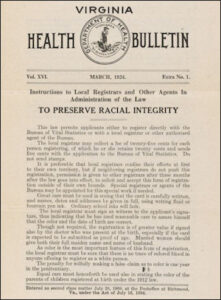This 1956 law, enshrined in Chapter 59 of the Acts of the General Assembly, is a dead letter, rendered irrelevant by judicial rulings, others laws, and history, but it’s still on the books:
Notwithstanding any other provision of law, no child shall be required to enroll in or attend any school wherein both white and colored children are enrolled.
“The Commission to Examine Racial Inequity in Virginia Law,” commissioned by Governor Ralph Northam, identified this and 97 other Jim Crow-era laws still lurking in the state code. The governor has committed to repeal the racially discriminatory language. You can view the report here.
“If we are going to move forward as a Commonwealth, we must take an honest look at our past,” said Northam in a press statement. “We know that racial discrimination is rooted in many of the laws that have governed our Commonwealth—today represents an important step towards building a more equal, just, and inclusive Virginia.”
States the report:
Though most of these pieces of legislation are outdated and have no legal effect, they remain enshrined in law. The Commission believes that such vestiges of Virginia’s segregationist past should no longer have official status. The Commission also notes that there have been several previous Acts on topics codified in the Code of Virginia that have since been declared unconstitutional or otherwise invalidated. Without repeal, these provisions could be revived with a change of law or interpretation by a different leadership or court. The Commission recommends that they, too, be repealed.
The Commission focused mainly on three periods of the 20th century: 1900-1910, the era in which most states in the former Confederacy adopted new constitutions disenfranchising African Americans; 1918-1920s, coinciding with the resurgence of the Ku Klux Klan; and the mid- to late-1950s during Virginia’s reaction to federally mandated school desegregation.
A selection of some of the laws recommended for repeal:
- A 1903 law implementing the state poll tax.
- A 1906 law requiring a separation of white and colored passengers on cars operated by electricity.
- A 1908 law permitting chain gangs to be used in the Town of Narrows in Giles County for violations of town ordinances.
- A 1918 law providing for separate sanatoria for white people and colored people.
- A 1956 law divesting localities of authority over local schools when local officials voluntarily integrated their schools.
Bacon’s bottom line:
These laws are an embarrassment and a blight on the Code of Virginia and should be expunged in the 2020 session of the General Assembly. I have criticized Northam for his leftward lurch on social- and racial-justice issues, but I laud his decision to appoint this Commission and fully support his actions to cleanse state laws of any taint of racial discrimination. Ridding the Code of these barbaric remnants will have no practical effect on race relations in Virginia today. But the law is (or should be) color blind, and General Assembly action to make it so is way overdue.


Leave a Reply
You must be logged in to post a comment.